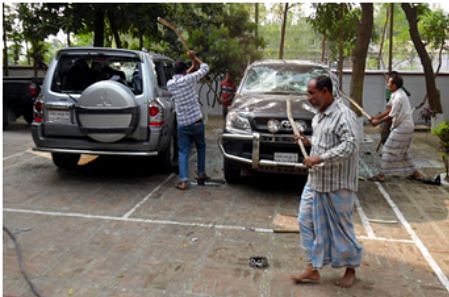Farewell to FDI?

THE Phulbari “controversy” has been going on for eight years now. The environmentalists' groups have always been opposed to open-pit mining and the site remains a focal point of resistance. The incident that occurred in November, 2014 has brought the issue to limelight once again and it becomes necessary to get certain facts straight. Incidentally, a responsible official of the Ministry of Energy around the same time issued a statement (erroneously) that there exists no contract between the government and Asia Energy Corporation (AEC) for mining at the site in question. Getting back to the subject at hand, the blockade by locals at Dinajpur and the subsequent vandalism that occurred on AEC site has sent entirely the wrong sort of signal to prospective foreign investors.
That a number of protesters can attack the offices of a foreign company in the presence of law enforcers and vandalise vehicles and smash property while the local administration representative is present is ludicrous. Although the situation was brought under control later, the damage to the country's image as a safe place to do business in has been significant. Although some overenthusiastic ministerial official may state that no contract exists, the facts point to something else entirely.
According to Energy & Power report 'Records Need making Straight': “BHP submitted exploration report to the government and informed its decision to withdraw from Bangladesh. At the same time, within the scope of the contract (clause 11) and Mines and Minerals Rules (clause 12, 13), the government approved the application for transferring existing contract and Licensing to Asia Energy (Bangladesh) Pty Ltd. In this regard, prior vetting was taken from Law Ministry. License was transferred to Asia Energy on 11 February, 1998 during the 1996-2001 term of Bangladesh Awami-League led government. The Foreign Minister of Australia was present during the signing of the agreement.”
Subsequently, AEC obtained 'mining lease' in April 2004 and environmental clearance in September 2005. From this point on it gets interesting. The company submitted its feasibility study to the government in October 2005 to start operations for an “open cut mine having a production capacity of 15million tonnes of coal per annum.” Nearly a decade has elapsed, governments have come and gone, and yet no government has either accepted or rejected that study. Now what sort of message does that give out to the international exploration companies? Can Bangladesh be expected to be taken seriously? With the agreement remaining valid since the government has not rejected it, is it any wonder that we have failed to make headway with foreign companies to explore new energy sources?
It is obvious that according to available documentation, the AEC has fulfilled all contractual obligations. Rather it is the government which is dilly-dallying with the question of extracting coal from Phulbari. The question at this juncture is precisely how long can the government afford to keep this matter hanging? It is not for the first time a ministry official has said that the government did not sign the lease agreement with AEC. Also, we may recall that the previous BNP government's energy adviser stated to the press that the government has a Contract with AEC but it is an 'anti-state' contract. Should the terms of a contract signed between the State and AEC prove unpalatable for whatever reason, then would it not make sense to rescind the contract? Why isn't this being done? Has it anything to do with damages that may have to be paid out to the company? What about the damage to the reputation of the country, or is that not a problem for the elected government in power?
With regards to the incident at Phulbari on November 26 and the mayhem that followed, consider the following. If AEC is operating legally in Bangladesh, the company CEO has the legitimate right to visit his office and conduct his company activities. Even if AEC project's status is not known by the local officials, should they allow a group of self-proclaimed 'national committee' activists to enter into the office of the foreign company and allow them to vandalise its property and physically assault company officials? What action has the local administration taken against those who at regular interval organise such vandalism? Or, are we then to assume that it is a conscious attempt by officials to demonstrate that AEC's presence is unwanted in the country? In that case, is it not logical for the government to take legal measures instead of encouraging vandalism? What message then are policymakers giving out to potential investors about treating a legitimate company (and FDI initiative) intending to work in Bangladesh?
All this is ironic to say the least since only last week the state minister for energy stated that we have no way but to extract local coal to meet national energy demand. And that we are fast running out of time to take a decision on coal as gas reserves are depleting at an alarming rate. Would the government care to explain precisely what progress it has made so far to secure primary energy supply? Also, the attitude and style of handling of the matter by the government officials clearly sends wrong signals to the foreign investment community. It is not political unrest and uncertainty alone that cause the negative impacts on investment.
The writer is Assistant Editor, The Daily Star.

 For all latest news, follow The Daily Star's Google News channel.
For all latest news, follow The Daily Star's Google News channel. 



Comments